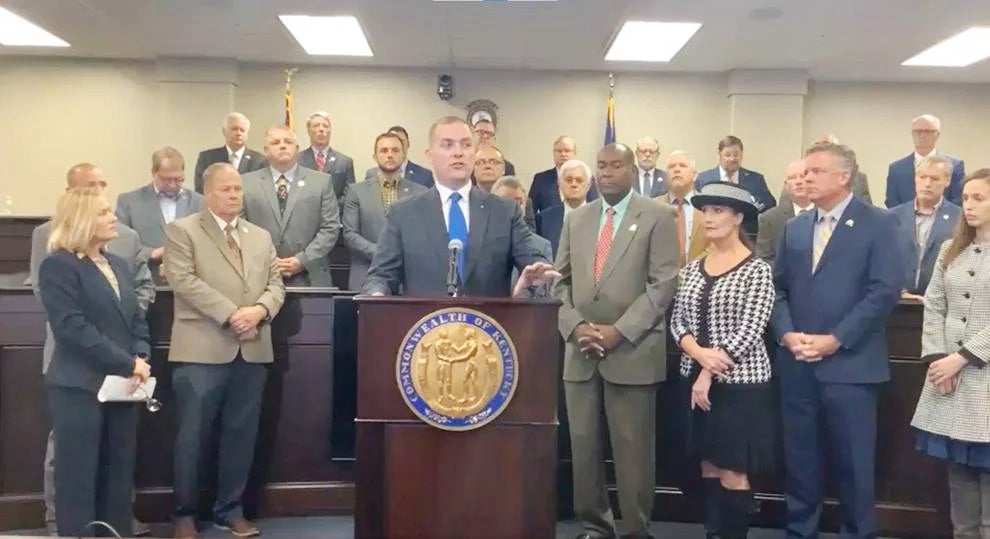Senator proposes another pro-life amendment
Published 5:16 pm Tuesday, February 21, 2023

- Sen. Whitney Westerfield, joined by members of the pro-life caucus, addresses reporters at a press conference on Thursday, October 27. Facebook image via Kentucky Today
|
Getting your Trinity Audio player ready...
|
BY TOM LATEK
Kentucky Today
Several months after Kentuckians rejected a constitutional amendment that would have clarified the state’s founding legal document did not protect access to abortion, Sen. Whitney Westerfield, R-Crofton, filed a similar bill that would send another amendment before voters.
Senate Bill 118 would add a new section to the constitution stating, in part: “Nothing in this Constitution secures or protects a right to abortion or requires the funding of an abortion.”
A firm belief in protecting unborn life “is the motive behind this and every other prolife bill I’ve filed, co-sponsored, or voted to support” said Westerfield in emailed comments on Wednesday.
Tamarra Wieder, Kentucky state director for Planned Parenthood Alliance Advocates East, noted on Twitter that Kentucky already spoke on the issue of abortion rights and the constitution.
“Abortion is a winning issue, and you are a sore loser,” she tweeted Tuesday, adding that Westerfield “doesn’t understand consent, NO means NO.”
ACLU of Kentucky echoed Wieder.
“Voters rejected the same proposal last fall. Extreme politicians will stop at nothing to force Kentuckians to remain pregnant against their will,” the organization tweeted on Tuesday.
Westerfield’s bill adds language that was not present in Amendment 2, which Kentucky voters rejected by a margin of 4.8 percentage points on Nov. 8: “The people retain the right through their elected state representatives and state senators to enact, amend, or repeal statutes regarding abortion, including but not limited to circumstances of pregnancy resulting from rape or incest or when necessary to save the life of the mother.”
“SB 118 clearly reminds voters, in concise and easy to understand plain language, of the truth (that) they hold the power to elect representatives and senators to make policy decisions regarding exceptions to abortion,” Westerfield said. “The voters can choose their policymakers to make the decisions regarding increasing or limiting access to abortion.”
Amendment 2 did not clearly communicate this right and opponents capitalized on the lack of clarity in their campaign against the measure, he added.
Westerfield noted leaders in both chambers have indicated constitutional amendments may not move forward this session “primarily since no proposed amendment can be on the ballot until the general election in an even year. In the event the legislature decided to advance any proposed amendment I wanted this amendment to be part of the conversation.”
Should SB 118 fail to advance in the legislature this year, Westerfield intends to file the bill again in 2024.





